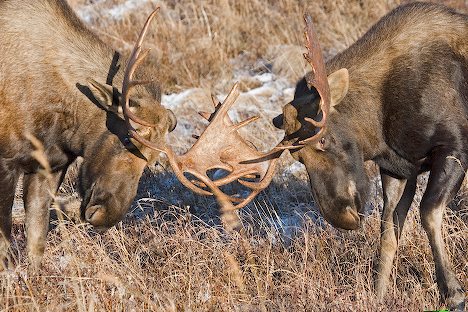Example 3:
 (Photographer: Donna Dewhurst)
(Photographer: Donna Dewhurst)
The Moose bulls will seek several females to mate with each season starting
around September and October. Fighting for a mate can be over very quickly
if one adult male is trying to compete with a younger bull as the younger
one will usually retreat, but two grown males fighting can turn into a very
ferocious and violent battle.
The mating competition
between the males does not directly benefit the males, they would have
been better off feeding instead of risking injury. The competition also does
not benefit the female, since it hardly matters to her pregnancy which male
impregnated her. Indeed, modern females in developed countries have fewer
children and have them later, if at all. We can see mating rituals and
competitions as part of a group-level
skill-set, which includes gender-based skills such as differentiating
between males and females and fighting (for males).
These complementary skills appear to benefit the group more than the
individuals involved by increasing the frequency of passing genes from the
'better' male to the next generation.
Question 1: Are there innate group-level interdependent, complementary, and interactive skills?
Question 2: How does the information exchange work that allows the skilled actions from these innate group-level skills to be coordinated?
Question 3: Are there learned group-level interdependent, complementary, and interactive skills?
Short answer 1: It appears that we can observe both gender-based and age-based skill-sets, such as mating rituals. This research addresses the possible mechanisms, depending on other researchers' empirical observations.
Short answer 2: All senses seem to be involved, and the information, such as bird song, is often observable. This research assumes that the same type of mechanisms that integrate perception into action are involved.
Short answer 3: Basic mechanisms for this are being explore. We speculate that human language may be a very advanced example (and beyond the scope of this investigation).